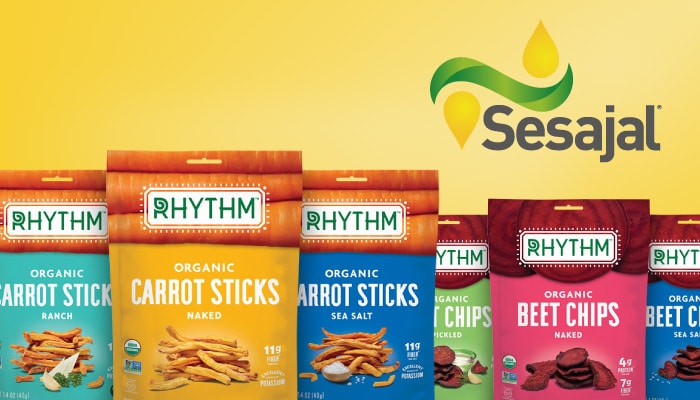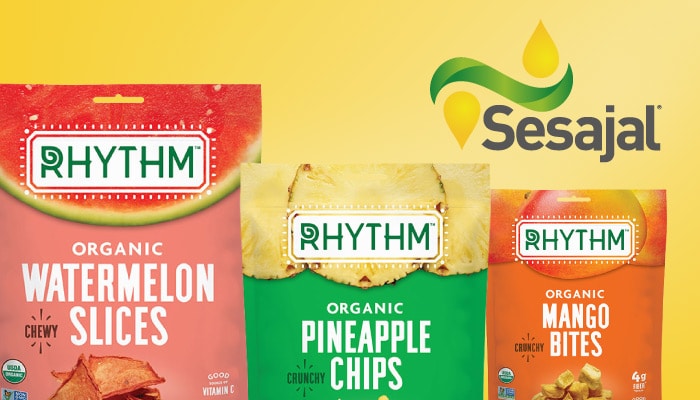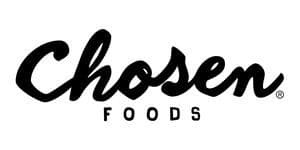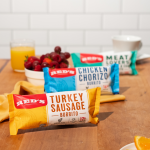Sesajal Invests in Rhythm As it Looks to Further Build Branded Business

Americans are eating a lot of snacks, and Sesajal S.A. de C.V. wants a bite. The ingredient processor and owner of condiment brand Chosen Foods announced last week the closing of a minority investment in produce-focused snack brand Rhythm Superfoods.
The investment, which closed in April but was only recently disclosed, consisted of capital, finished product and equipment, including a production facility in Guadalajara Mexico. Rhythm plans to seek additional funding within the next few months but needed to close this part of the round in order to assume ownership of the plant, which has been renamed Alamo in honor of Rhythm’s Austin roots.
Sesajal has been Rhythm’s copacker for almost six years, and the investment is aimed at helping the two companies better integrate and align their business goals. The brand originally was producing its vegetable and fruit snacks in Colorado, but realized that being closer to where the raw produce was grown could improve product quality and reduce costs. According to Rhythm founder and CEO Scott Jensen, Guadalajara is an ideal location because produce can be grown 12 months of the year.
“When you have a copacker and customer relationship, in and of itself, that creates a friction,” Jensen said. “We’re all on the same side of the table now and that’s unleashed the partnership in a way that it couldn’t have been if it was done any other way.”
Sesajal CEO Iñigo Gonzalez added that the deal provides his company with more insight into the entire life cycle of the business, which can inspire greater collaboration on R&D, sales and marketing further down the line. For example, Sesajal has distribution for its products in Mexico, South America, Europe, Asia and some of the Middle East, which are markets Rhythm could eventually move into as well.
“You need to put your efforts and energy where you can clearly see the opportunities to add value,” Gonzalez said. “We were not adding that much value operating the facilities without being integrated…not knowing what would happen to the product once it left the facilities.”
Sesajal has an integrated supply chain that is unique to its business, Jensen said. By agreeing to purchase all crops in advance, regardless of quality, Sesajal has input into the growing methods and crops of its partner farms. The purchasing strategy works only because the company has so many uses for each ingredient, Chosen Foods CEO and Chairman Gabriel Perez added.
Now, Jensen said, Rhythm will also benefit from this robust supply chain, noting that Sesajal has already helped the brand secure additional sourcing for its cauliflower bites line. Because Rhythm only needs the florets from the plant, the ingredient processor will dehydrate, pulverize and sell the plant’s stems and smaller pieces as a bulk cauliflower flour.
The deal will also move Sesajal further into the branded CPG product world, the culmination of a process that started seven years ago, Perez said. At the time, 95% of the company’s sales came from B2B ingredient deals; Now, following the acquisition of Chosen Foods in 2017 and its subsequent expansion, revenue is closer to a 50/50 split between ingredients and branded products.
Gonzalez said the company chose to take a slower path into CPG because it wanted to make sure it had the supply chain in place to support these efforts. Unlike other companies which might launch a product and only build out a deeper supply chain once it’s needed, he added, Sesejal tends to do “things in reverse” and make sure the backend is secured upfront.
“We’re not going out on a shopping spree and investing in five different companies,” Perez added. “We want to do it orderly but there’s definitely interest in bringing [in] not just brands that we love but brands that we can integrate [with] that supply chain component.”
Jensen said he believes that an integrated supply chain will become even more important as the food system faces major challenges such as the Covid-19 pandemic, which saw sales of some healthy, shelf stable products — such as Rhythm’s dehydrated fruits and vegetable snacks and Chosen Food’s avocado oils — spike. Because Sesajal plays a role from seed to store, the company was able to flex to meet demand, Perez said.
“Covid-19 has been the perfect test for our business model because from one day to another, the market requested as much as we could produce,” Perez said. “We are the owners of our own destiny and that flexibility and that capability and that knowledge allows us to react at a speed that the market today requires.”


















